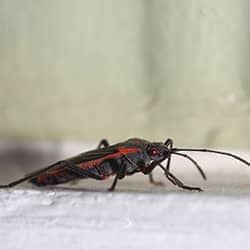Do you ever wonder where insects go for the winter? Most insects can't survive the freezing cold. So how do they keep appearing in our Brentwood yards, year after year? In nature, they hide behind the bark of trees, tunnel deep into the ground, take refuge in a cave or under some rocks. These places provide protection from the wind, but they aren't quite enough to save most insects from the cold. Some must go into a dormant state called diapause which allows them to withstand cold temperatures and lets them conserve the energy stored in their cells to make it through the long winter months without starving. Some insects have the ability to replace the water in their bodies with an antifreeze compound that keeps them from freezing to death. And some just die. Well, not right away. They prepare queens that will start new colonies in the spring, then they die. But there is one thing all of these insects have in common. They can use our homes as a place to wait out the winter.
Insects aren't picky about where they hide from the cold. They get into any crevice or hole. If those crevices and holes are on your home, you could have some trouble with overwintering pests this winter. Here are some of the ways they may get into your home.
- Any door that has a gap around it can allow insects to get in. One way gaps can form is when weatherstripping wears out. Inspect your doors and make sure you don't have any holes. If you do, replace the stripping and see if that fixes the problem.
- Window screens are our frontline defense against insects but, when it comes to overwintering pests, it is the frame around our windows that are the most vulnerable. When caulking breaks and holes develop, stink bugs, ladybugs, boxelder bugs, and other pests can get into the wall voids.
- Holes in eaves and soffits are a popular entry point for flying insects. Make sure you don't have any broken areas.
Sometimes insects don't come all the way in. They may hide under your siding, just like they would hide under the bark of a tree. When queen wasps do this it increases the possibility that you'll have a wasps nest on your home this coming spring.
If you find the holes and seal them up, you can stop some overwinter pests from getting into your home. But for the best protection possible, it is best to have a licensed professional apply a treatment to stop those pests in their tracks.
At All-American Pest Control, overwintering pests are just some of over 47 pests we cover with our year-round pest control service. If you've had it with those winter invaders, give us a call. Our Brentwood pest control experts can help.
 1426 Reviews
1426 Reviews


